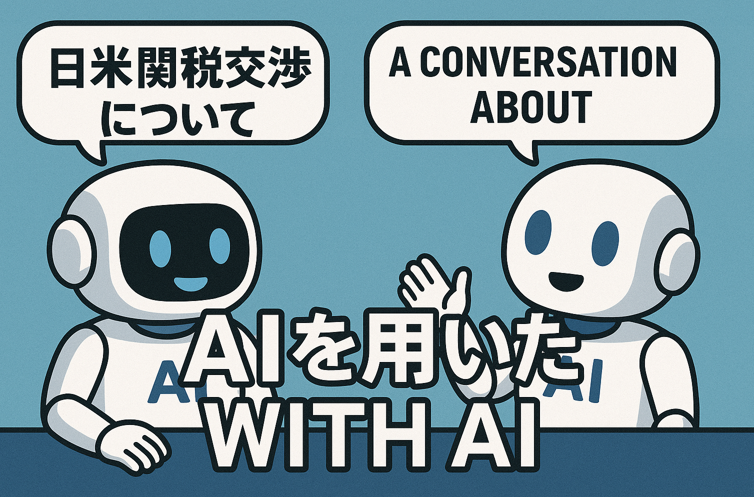時事ニュースで学ぶ!ビジネス英会話 (Page 2/5)
テーマ:主要な業界への影響
Discussion Questions
- Which Japanese industries do you think will be most affected by US tariffs? (どの日本の業界が、米国の関税によって最も影響を受けると思いますか?)
- How would tariffs on Japanese cars impact the automotive industry? (日本の自動車への関税は、自動車業界にどのような影響を与えますか?)
- Which US industries might benefit from these negotiations? (これらの交渉から、どの米国の業界が利益を得る可能性がありますか?)
- How might the Japanese agricultural sector react to lower tariffs on US farm products? (日本の農業セクターは、米国農産物への関税引き下げにどのように反応するでしょうか?)
- Could tariffs on steel and aluminum affect the construction industry in Japan? (鉄鋼やアルミニウムへの関税は、日本の建設業界に影響を与える可能性がありますか?)
- What is a “supply chain,” and how can tariffs disrupt it for the electronics industry? (「サプライチェーン」とは何ですか?関税は電子機器業界のそれをどのように混乱させる可能性がありますか?)
- Do you think Japanese technology companies rely heavily on US components? (日本のテクノロジー企業は、米国の部品に大きく依存していると思いますか?)
- How might the tourism and travel industry be indirectly affected by trade tensions? (貿易摩擦によって、観光・旅行業界は間接的にどのような影響を受ける可能性がありますか?)
- If US beef becomes cheaper, how will this impact Japanese beef producers? (もし米国産牛肉が安くなったら、日本の牛肉生産者にどのような影響がありますか?)
- What kind of impact would tariffs on wine have on restaurants and bars in Japan? (ワインへの関税は、日本のレストランやバーにどのような影響を与えるでしょうか?)
- Can you name a product whose price might fall for consumers due to these negotiations? (これらの交渉の結果、消費者にとって価格が下がる可能性のある製品を挙げられますか?)
- Why might a Japanese company consider moving its production out of the US? (なぜ日本企業は、生産拠点を米国から移すことを検討するのでしょうか?)
- How could the shipping and logistics industry be affected by changes in import/export volumes? (輸出入量の変化は、海運・物流業界にどのように影響する可能性がありますか?)
- Do you think the fashion/apparel industry will see a big impact from these tariffs? (ファッション・アパレル業界は、これらの関税から大きな影響を受けると思いますか?)
- What is the difference between a direct and an indirect impact on an industry? (業界への直接的な影響と間接的な影響の違いは何ですか?)
- How can Japanese industries prepare for the potential negative effects of tariffs? (日本の産業界は、関税の潜在的な悪影響にどう備えることができますか?)
- Will the energy sector (oil, gas) be significantly impacted by these talks? (エネルギーセクター(石油、ガス)は、これらの交渉によって大きな影響を受けますか?)
- Which industry do you think is in the safest position regarding these negotiations? (これらの交渉に関して、どの業界が最も安全な立場にあると思いますか?)
- How do tariffs influence competition between domestic and foreign companies? (関税は、国内企業と外国企業の間の競争にどのように影響しますか?)
- If you were the CEO of a major automaker, what would be your biggest concern right now? (もしあなたが大手自動車メーカーのCEOなら、今一番の懸念は何ですか?)
Discussion Questions
- Analyze the long-term strategic adjustments the Japanese automotive industry might need to make in response to persistent tariff threats. (日本の自動車業界が、継続的な関税の脅威に対応するために行う必要のある長期的な戦略的調整を分析してください。)
- Debate the proposition: “Targeted tariffs are a legitimate tool for leveling the playing field for domestic industries.” (「的を絞った関税は、国内産業にとって公平な競争条件を確保するための正当な手段である」という命題について討論してください。)
- Propose a diversification strategy for a Japanese electronics company to mitigate risks associated with supply chain disruptions from US-Japan trade friction. (日米貿易摩擦によるサプライチェーンの混乱に関連するリスクを軽減するために、日本の電子機器企業の多様化戦略を提案してください。)
- Critically evaluate the claim that protecting the domestic agricultural sector is vital for Japan’s food security, even if it leads to higher costs. (たとえコストが高くなっても、国内の農業セクターを保護することは日本の食料安全保障にとって不可欠であるという主張を批判的に評価してください。)
- Hypothesize the cascading effects of a major disruption in the semiconductor supply chain between the US and Japan on global manufacturing. (日米間の半導体サプライチェーンにおける大規模な混乱が、世界の製造業に及ぼす連鎖的な影響について仮説を立ててください。)
- Assess the potential for “tariff engineering,” where companies modify products or processes to fall into lower tariff categories. (企業がより低い関税分類に該当するように製品や工程を変更する「関税エンジニアリング」の可能性を評価してください。)
- Formulate a risk management plan for an airline company facing potential indirect impacts from a trade war, such as decreased business travel. (貿易戦争によるビジネス渡航の減少など、潜在的な間接的影響に直面している航空会社のリスク管理計画を策定してください。)
- Debate whether Japanese industries have become overly dependent on the US market and what steps should be taken. (日本の産業は米国市場に過度に依存するようになったか、またどのような措置を講じるべきかについて討論してください。)
- Analyze the competitive landscape of the global beef market if US beef gains greater tariff-free access to Japan, considering Australian and Canadian producers. (オーストラリアやカナダの生産者を考慮に入れ、もし米国産牛肉が日本へのより大きな無関税アクセスを得た場合の、世界の牛肉市場の競争環境を分析してください。)
- Propose a government support package for a legacy industry (e.g., traditional textiles) that is disproportionately affected by a new trade deal. (新しい貿易協定によって不釣り合いな影響を受ける伝統産業(例:伝統的な織物)に対する政府の支援パッケージを提案してください。)
- Critically evaluate the effectiveness of retaliatory tariffs as a negotiation tactic. What are the main risks for the industries in the retaliating country? (交渉戦術としての報復関税の有効性を批判的に評価してください。報復する側の国の産業にとっての主なリスクは何ですか?)
- Hypothesize how the negotiation outcomes could accelerate the shift towards electric vehicles (EVs) and automation in the auto industry. (交渉の結果が、自動車業界における電気自動車(EV)への移行と自動化をどのように加速させるかについて仮説を立ててください。)
- Analyze the impact of intellectual property (IP) provisions within a trade agreement on the pharmaceutical and software industries. (貿易協定内の知的財産(IP)条項が、製薬およびソフトウェア業界に与える影響を分析してください。)
- Debate the statement: “In a globalized economy, the concept of a ‘national’ industry is obsolete.” (「グローバル化した経済において、『国家的』産業という概念は時代遅れだ」という声明について討論してください。)
- Propose a collaborative R&D strategy between US and Japanese tech firms to create a more resilient, less politically vulnerable supply chain. (より強靭で政治的に脆弱でないサプライチェーンを構築するために、日米のハイテク企業間の共同研究開発戦略を提案してください。)
- Critically assess the role of industry lobby groups in shaping the government’s negotiating positions. (政府の交渉ポジションを形成する上での業界ロビー団体の役割を批判的に評価してください。)
- Imagine you are a consultant. Advise the Japanese machine tool industry on how to navigate a climate of increasing protectionism. (あなたがコンサルタントだと想像してください。日本の工作機械業界に、保護主義が高まる環境をどう乗り切るか助言してください。)
- Analyze the potential shift in foreign direct investment (FDI) flows between the two countries as a result of the tariff policies. (関税政策の結果として生じる、両国間の海外直接投資(FDI)の流れの変化を分析してください。)
- Debate the pros and cons of including environmental and labor standards in trade agreements for affected industries. (影響を受ける産業にとって、貿易協定に環境基準や労働基準を含めることの長所と短所を討論してください。)
- Hypothesize the future of the Japan-US economic partnership if they successfully create a new model for trade that moves beyond simple tariff reductions. (もし日米が単純な関税引き下げを超えた新しい貿易モデルの創出に成功した場合、日米経済パートナーシップの未来について仮説を立ててください。)

